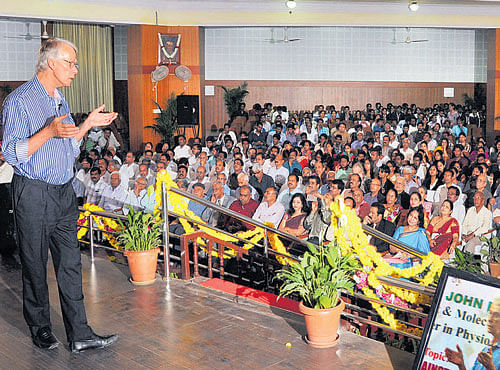Nobel laureate bats for GM crops to fight hunger
Last Updated IST

Nobel laureate Sir Richard John Roberts delivers a talk at the centenary lecture series organised by the University of Mysore on Monday. DH PHOTO
Genetically Modified Organisms (GMOs) should be promoted in a big way to ensure enough food production in developing countries, Nobel laureate Sir Richard John Roberts has said, but advocated production of seeds of local food crops preferably by government agencies.
He was delivering a talk on ‘A Crime Against Humanity’ under the centenary lecture series organised by the University of Mysore on Monday. An English biochemist and molecular biologist, he won the Nobel Prize in Physiology or Medicine in 1993.
Explaining the importance of food, Sir Roberts said when people were hungry, they needed food and would think of nutritious food only when they had sufficient food to satiate their hunger. “So, medicines for ailments is not a hungry man’s priority. Rich European countries are opposing introduction of GM crops because they have sufficient food. Their propaganda against GM crops is affecting hungry people in the developing nations. To help people in need, we need more science in politics and less politics in science,” he said.
Describing the topic itself as controversial, he asked why should not the denial of food to people in developing nations by developed nations be considered a crime against humanity. “The developed nations are politicising the issue, making the people in need scapegoats. Plants have been modified gradually to meet the needs of the people ever since the inception of agriculture. In GM plants, single-disease resistance can be engineered, which can be described as precision agriculture. GM crops can do wonders to the food supply chain,” he warned.
Sir Roberts said GM crops had been developed over ages on the fields, but in a crude way, which were called hybrids. “The present engineering of GM crops is precise and the results are evident. In India, in the year 2001, the use of pesticides used to produce 308 kg of hybrid cotton was 5,708 tonnes, while in 2013, for GM BT cotton, the use of pesticides was reduced to 222 tonnes for harvesting 500 kg of the produce.
Farmers have been purchasing hybrid seeds from big companies for cultivation for a long time now and the fear that farmers will be made dependent on these companies if GM crops are introduced are unfounded. Farmers need not depend on private companies for seeds. Government research institutions can develop and distribute GM seeds,” he said. Vice-Chancellor K S Rangappa and Registrar C Basavaraju were present.
He was delivering a talk on ‘A Crime Against Humanity’ under the centenary lecture series organised by the University of Mysore on Monday. An English biochemist and molecular biologist, he won the Nobel Prize in Physiology or Medicine in 1993.
Explaining the importance of food, Sir Roberts said when people were hungry, they needed food and would think of nutritious food only when they had sufficient food to satiate their hunger. “So, medicines for ailments is not a hungry man’s priority. Rich European countries are opposing introduction of GM crops because they have sufficient food. Their propaganda against GM crops is affecting hungry people in the developing nations. To help people in need, we need more science in politics and less politics in science,” he said.
Describing the topic itself as controversial, he asked why should not the denial of food to people in developing nations by developed nations be considered a crime against humanity. “The developed nations are politicising the issue, making the people in need scapegoats. Plants have been modified gradually to meet the needs of the people ever since the inception of agriculture. In GM plants, single-disease resistance can be engineered, which can be described as precision agriculture. GM crops can do wonders to the food supply chain,” he warned.
Sir Roberts said GM crops had been developed over ages on the fields, but in a crude way, which were called hybrids. “The present engineering of GM crops is precise and the results are evident. In India, in the year 2001, the use of pesticides used to produce 308 kg of hybrid cotton was 5,708 tonnes, while in 2013, for GM BT cotton, the use of pesticides was reduced to 222 tonnes for harvesting 500 kg of the produce.
Farmers have been purchasing hybrid seeds from big companies for cultivation for a long time now and the fear that farmers will be made dependent on these companies if GM crops are introduced are unfounded. Farmers need not depend on private companies for seeds. Government research institutions can develop and distribute GM seeds,” he said. Vice-Chancellor K S Rangappa and Registrar C Basavaraju were present.